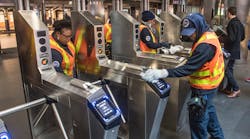Survey: North American commuters are switching habits as result of novel coronavirus
A survey conducted by Northstar Research Partners found respondents of the both the United States and Canada are changing the way they travel as a direct result of the novel coronavirus threat.
The survey determined residents of both countries are staying home or relying on their cars more in response to the threat and both groups did not express confidence in the actions taken by public transit entities to mitigate the spread of the virus.
"People's movement away from public transit is likely to have long-term consequences," says Jennifer Yellin, senior vice president and co-lead of Northstar's Transportation Practice. "The implications include lost revenue for public transit authorities, which is ultimately used to upgrade and maintain systems. There is also the potential for increased traffic and congestion on roads, which could result in increased pollution and have longer range environmental impacts.”
Northstar Research Partners says the surveys were conducted online between March 6-March 8, 2020, using an amalgamated group of best-in-class panels. The surveys were conducted among a nationally representative sample of U.S. residents and Canadian residents, all above 18 years of age.
Results were as follows:
- 40 percent of Canadians 50 percent of U.S. respondents said they are very or extremely concerned about the virus
- 48 percent of U.S. respondents and 40 percent of Canadians feel that riding public transit poses a high health risk due to the virus.
- 30 percent of Canadians and 30-40 percent of U.S. respondents report decreased usage of public transportation as a direct result of the virus.
- Close to two-thirds of both Canadians and U.S. respondents believe airports and airlines are taking the appropriate steps to reduce their risk of contracting the novel coronavirus. That confidence did not extend to public transit systems, but Northstar Research Partners notes 30 percent of Canadians and 25 percent of U.S. respondents do not believe any company associated with travel is taking the appropriate steps to reduce their risk.
Transit service providers in both countries have undertaken large cleaning efforts to ensure buses, trains and high-touch areas are disinfected, as well as additional measures to protect riders and staff.
“The ultimate question is whether these riders will return to public transit or stick with their cars long-term," said Yellin.

Mischa Wanek-Libman | Group Editorial Director
Mischa Wanek-Libman is director of communications with Transdev North America. She has more than 20 years of experience working in the transportation industry covering construction projects, engineering challenges, transit and rail operations and best practices.
Wanek-Libman has held top editorial positions at freight rail and public transportation business-to-business publications including as editor-in-chief and editorial director of Mass Transit from 2018-2024. She has been recognized for editorial excellence through her individual work, as well as for collaborative content.
She is an active member of the American Public Transportation Association's Marketing and Communications Committee and served 14 years as a Board Observer on the National Railroad Construction and Maintenance Association (NRC) Board of Directors.
She is a graduate of Drake University in Des Moines, Iowa, where she earned a Bachelor of Arts degree in Journalism and Mass Communication.



